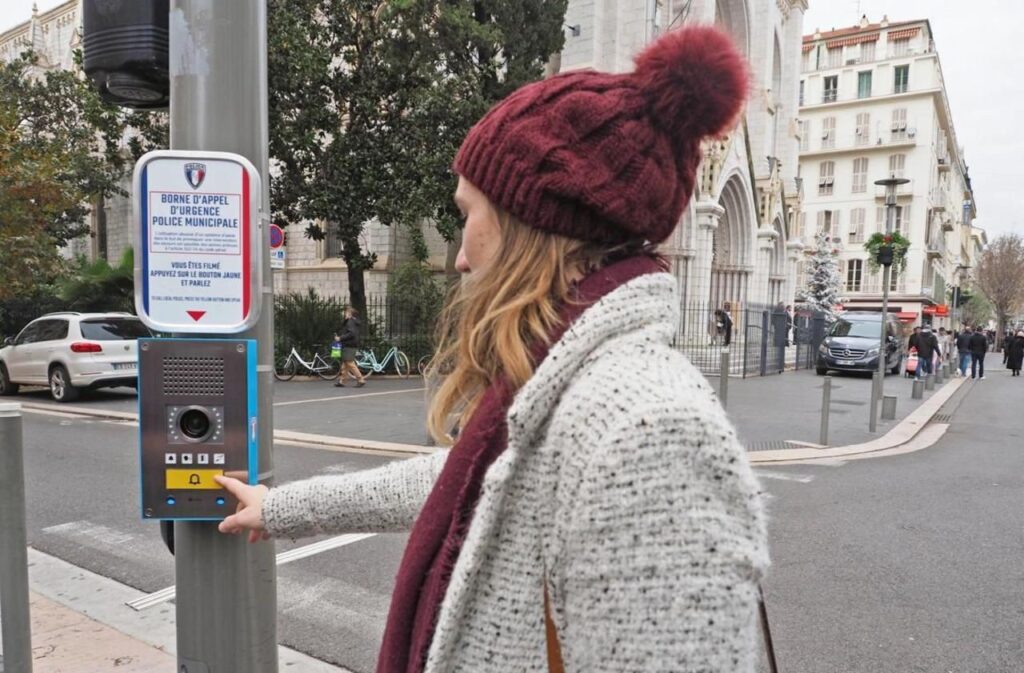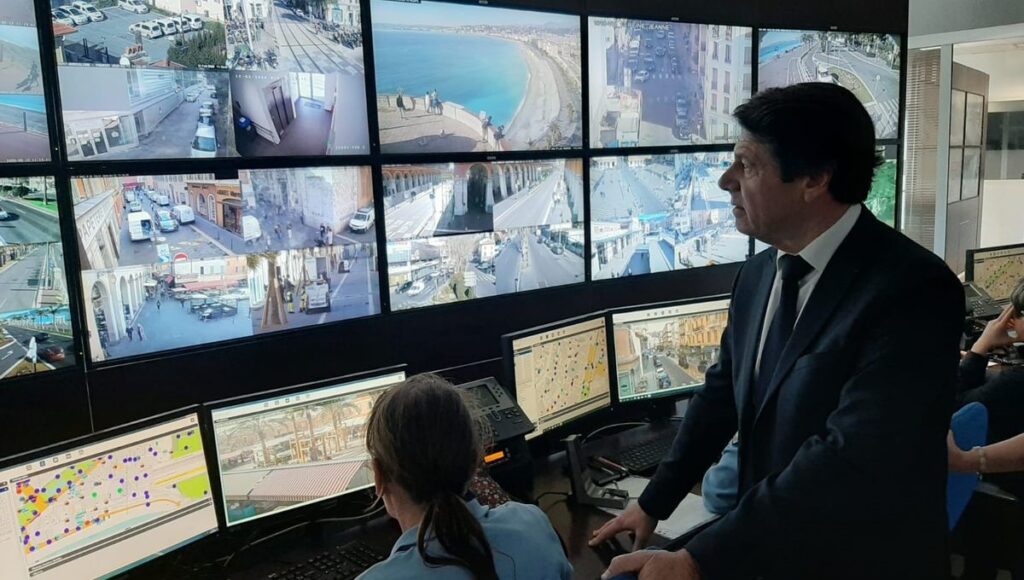Month: February 2021
Stuttgart: remaining safe at a time of fundamental changes
Stuttgart, the capital of the federal state of Baden-Württemberg in the south-west of Germany (pop. 635,000) is well known for its spirit of innovation and optimism. Home to the German automobile industry, it consistently ranks as one of Europe’s most liveable and safest cities. We’ve met with Felix Grünwald and Gregor Belgardt of the municipality’s Crime Prevention Office.
Why did the city of Stuttgart join IcARUS?
Felix Grünwald and Gregor Belgardt: Crime statistics show that Stuttgart is a very safe city. Indeed, it has consistently ranked as one of the safest large cities in Germany for quite a while now. Stuttgart is very proud of its track record in ensuring urban security and of the resulting high quality of life for its citizens. It therefore considers security and social cohesion as important fields of action. By joining IcARUS, the municipality intends to make sure that Stuttgart remains safe at a time of fundamental changes, not only in urban security but in society in general. To achieve this, international exchange and networking are more important than ever. Indeed, we can only do so by learning from other institutions and by sharing our own perspective and experience with others.
Stuttgart decided to focus on the issue of radicalisation. Why?
Processes of radicalisation are a significant danger to urban security and social cohesion. Regardless of whether people are radicalised by others or on their own, they pose a potential threat to our cities. The events of the past years revealed the massive perils caused by radicalisation processes. However, addressing radicalisation at the local level is difficult because of the widespread networks of possible offenders. By developing a local multi-stakeholder strategy to prevent radicalisation, IcARUS might provide an improved approach to de-radicalisation.
What are your expectations regarding the outcome of IcARUS?
Firstly, IcARUS will assess future challenges to urban security. While the project’s core documents already discuss current and future challenges to urban security, it might also be able to define and assess further challenges and problems. In addition, IcARUS provides an opportunity to engage in an international exchange and dialogue about the challenges that lie ahead. Its diverse consortium should prove a lively group of experts, willing to learn and inform others. The project’s aim to promote a multi-stakeholder approach, to tackle future challenges to urban security, is of high relevance to the city of Stuttgart. We think it is particularly important to create urban security tools that are based on the evaluation of past prevention programmes and that reflect current developments in science. In particular, we need such tools to prepare our urban security strategy for the future. The city of Stuttgart appreciates the project’s ambitious goal of enhancing and improving local approaches to urban security.


Riga: a holistic approach to the security of public spaces
Most European cities were built a long time ago, when nobody gave much thought to the safety of residents. Nowadays, cities are faced with new threats that have emerged in the present century, and Riga is no exception. We expect the IcARUS project will provide us with useful solutions as part of a multimodal approach.
The capital of Latvia, one of the Baltic states, Riga has a population of 637,931 according to the Central statistics office (2020), but it realistically has closer to one million on any given day if we take into account visitors who come to the city to work, study, shop or carry out administrative formalities.
Public safety in Riga is ensured by the Riga municipal police, whereas the national police is concerned by traffic control and the prevention of crime. Protecting public spaces is in the remit of Riga’s thousand or so municipal officers.
A priority: the protection of public spaces
Riga is a member of the European Forum for Urban Security (Efus) and regularly takes part in international projects in the field of crime prevention and urban safety. In the 21st century, protecting public spaces requires that both city councils and law enforcement agencies adopt a modern approach and vision and exchange their know-how and experience. Furthermore, they need to build their policies on social and urban research, and to benchmark inspiring practices developed elsewhere in order to implement such policies. In this respect, we believe the IcARUS project will help us achieve our objective of strengthening the protection of our public spaces.
Adopting a holistic approach
Designing and managing safe public spaces is not only an architectural concern. It requires a holistic approach involving different stakeholders, i.e. urban planners, law enforcement, social services, local residents, etc. As many other European cities, Riga was built a long time ago, at a time when nobody gave much thought to the safety of residents. Nowadays, we are faced with new threats that have emerged in the present century.
In order to respond to such threats, we expect the IcARUS project will provide us with useful solutions as part of a multimodal approach that strengthens crime prevention through urban design, the use of CCTV, adequate policing strategies, etc.
We believe that cooperation among the IcARUS partners will be successful and will benefit us all, but the clear winners will (of course) be the citizens of our cities.

Rotterdam: an open window to the world
A thriving European port home to over 650,000 inhabitants, Rotterdam defines itself as a city open to the world. They detail their urban security priorities and the benefits of cross-European collaboration through IcARUS.
Rotterdam is honoured to work with all the partners in the IcARUS project. With 651,000 inhabitants, Rotterdam is a city with an open window to the world. It is constantly renewing itself, if only because there are five to six thousand newcomers annually. It’s a city of cultural diversity, home to 174 nationalities. We know how important it is to stay connected to the world, working together with other European cities as well as universities and research institutions on public safety and security.
A safety programme that is renewed every five years
Working on safety and security in Rotterdam is a joint effort, which involves many organisations. Besides the police, residents, private security firms and entrepreneurs also work with us on safety and security issues. They help us to find solutions to the problems we face as a city. Universities and applied science institutions help us with research and (academic) insights and perspectives to improve our policies. The IcARUS project brings along the European dimension.
The Rotterdam city council adopts a new safety programme every five years, which includes, among other things, the more long-term ambitions. Secondly, a customised approach has been developed for each of the city’s 71 neighbourhoods. The municipal departments, police, the public prosecution service and residents work closely together on common problems to find suitable solutions. Private parties, such as housing corporations, entrepreneurs and schools are also involved in this approach.
An original safety evaluation tool
In addition to tackling the problems in the neighbourhoods, we developed an instrument for measuring the perceived safety of local residents titled the ‘Neighbourhood Profile’. We conduct a Neighbourhood Profile twice a year. This evaluation tool maps out the safety, social and physical situation of a neighbourhood and produces a visual chart. It is based on objective data from the police and municipal departments regarding reports from the public, and on the opinion of citizens themselves. The scores not only show which neighbourhood has a problem, but which problem is the most acute. The scores are allocated per theme, such as burglary and violence. Over the years, the importance of an integral approach – and with it an integral monitor – has become increasingly clear.
Safety issues cannot be resolved by simply focusing on safety: it is necessary to also take into account social and physical indicators. The neighbourhood profile also makes it possible to see the scores for each of the 71 Rotterdam districts, to establish comparisons, and to precisely know which safety problems are an issue in each district. It also signals the tasks that each district faces. We are aware of a possible gap between the objective numbers on safety and the subjective perception of local residents, which is also important to us.
The benefits of collaborating with other European cities
The Rotterdam safety approach priorities include, among others, those of the IcARUS project, as well as radicalisation, trafficking & organised crime, juvenile delinquency and public spaces. Public space is the domain where all safety and security measures come together, and also where the online world meets the offline world / reality. Cities are the ‘hands-on’ experts when it comes to safety and security. Collaboration between cities in Europe and around the world is extremely important for the future of our cities, working together to develop new approaches in the areas of counter terrorism, organised crime, radicalisation and cyber resilience. Cities will only be able to continue playing this important role if we listen to each other, share new insights and make sound agreements with one another. In this respect, the IcARUS project as well as Efus are important platforms to work together in Europe.
IcARUS will give us an overview of the best security policies over the last 30 years. We will be able to rethink and adapt existing tools and methods to remain a resilient city. A socially, physically and digitally resilient city takes action to reduce the vulnerability to risks and threats and knows how to limit the impact of incidents. A resilient city knows how to recover quickly when unforeseen events happen at international, national, regional and local levels.

Nice: pioneering new urban security solutions
One of the partners of the IcARUS project, the French city of Nice has long been forward-thinking in its local urban security policies, an area which is a top priority for Mayor Christian Estrosi.
The ‘capital’ of the French Riviera, Nice is the fifth-largest city in France and the second-largest on the French Mediterranean coast with some 350,000 inhabitants. Beyond the city itself, the agglomeration of Métropole Nice Côte d’Azur gathers 49 towns, totalling about 550,000 inhabitants. Nice’s Mayor, Christian Estrosi, who is serving his third mandate, is also President of the Métropole Nice Côte d’Azur.
High-tech municipal police
Nice has the largest municipal police in France, since the hiring of 59 municipal police officers in 2018 and 2019. The municipal police staff now totals 455 police officers and 183 public road surveillance officers (agents de surveillance de la voie publique, ASVP).
The Mayor of Nice considers urban safety as a top priority of his mandate and has long argued for more powers to be given to municipal police forces. As such, the municipal police has recently been equipped with body-worn cameras. The Nice Municipal Police was also the first in France to have its own Twitter account, providing information on its activity, giving advice to citizens and answering their questions.
Call terminals in public spaces
Following the October terrorist attack in the Notre-Dame Basilica, in the heart of the city, the municipality decided to increase the number of emergency telephone terminals installed in various public spaces and connected to the municipal police. The first ones were installed last year. Indeed, the one on avenue Jean Médecin was activated by passers-by during the attack in the basilica, which allowed municipal police to quickly intervene. In the wake of the attack, the municipality also decided to install 170 bollards in front of schools, colleges and high schools.

Now, one of the municipality’s key projects is to create a joint police command centre that will be shared by the local and national police forces. Titled the Urban Hypervision and Command Centre (CHUC), this shared equipment will further enhance the level of urban security and its perception by citizens by promoting an innovative governance model for all security actors involved in planning, providing and evaluating safety at the local level.
Involvement in other European projects
As we’ve seen, urban security is a top priority for the municipality, which is why it welcomed to opportunity to join the IcARUS team and share and improve its knowledge, technologies and experience in this field. This project will complement the activities carried out under the PRACTICIES (“Partnership against Violent Radicalization in Cities”) European project on the prevention of radicalisation, in which both the City of Nice and the Métropole were partners until its conclusion in April 2020. Furthermore, Nice is coordinating the Partnership on the security in public spaces of the Urban Agenda for the EU together with Efus and the City of Madrid.
The city of Nice highly appreciates to work with all the partners of IcARUS, an interesting project that will lead to innovative and efficient solutions to improve urban security.


Community policing in Lisbon – Sustainable local partnerships for safer neighbourhoods
Implementing a community policing model is a challenge for police forces and their partners in governmental agencies, municipal services and more broadly civil society because it requires a relationship of trust and long term commitment. In the past decade, the Lisbon Municipal Police (LMP) has been implementing a community policing model based on the active involvement of local partners and citizens, using an innovative methodology to build and sustain such partnerships over time.
Developed by the LMP in close collaboration with local partners, this methodology consists in jointly preparing the induction of community policing officers to a new territory. Before their deployment, the LMP and local partners work together on a joint planning process in order to prepare and support the officers’ work. It consists of four steps: i) establishing the police-community safety partnership; ii) building a local safety audit; iii) identifying the community policing team profile, and iv) selecting and training the community policing team.
Monthly meetings to identify local concerns
Once the safety partnership is set up, the partners meet once a month to produce an updated safety audit of the neighbourhood and identify the residents’ main security concerns. They then determine the police officers’ profiles that are best suited to the neighbourhood’s specific needs. This in turn guides their selection and training.
A particularly interesting aspect is that the training course includes not only the police officers, but also local stakeholders and representatives of local residents. This allows them to exchange early on and to better understand their respective needs and priorities, which is key to effectively co-produce community safety.
Once this participatory planning phase is completed, the new community policing team is ready to patrol daily their assigned neighbourhood and to network with the safety partnership.
This process ensures all the involved parties, in particular local residents, appropriate the community policing project, thus contributing to its sustainability over time. The responsibility for successful implementation on the ground is shared and thus the project belongs not only to the police, but also to the whole local partnership.
Focus on young people and on safe public spaces
However, there are key target groups that the LMP still needs to include in this process, namely young residents and urban planners. Indeed, it is necessary to develop effective strategies for working with young people and preventing risky behaviours, and on the other hand to foster collaboration between urban planners and the police when designing safe public spaces. In particular, the police’s perspective and know-how should be integrated into the planning of municipal urban projects.
The IcARUS project represents an opportunity for the Lisbon Municipal Police to further explore these issues. It will allow us to develop new tools and approaches, in particular in these two areas. Learning and sharing good practices with other European cities and academia through IcARUS will be crucial to equip the LMP with a set of innovative preventive tools that community policing teams can use to prevent risky behaviours among local youngsters and work more efficiently with urban planners when planning and designing safer public spaces.

Ensuring that IcARUS complies with high ethical and legal standards
The interest in ethics, in other words, critical reflection on how to differentiate what is right from wrong, what is proper from improper, or what is fair from unfair, to mention just a few of its main objectives, has accompanied humanity throughout its history. This has contributed to defining what traditionally has been called ethos, in other words the way of understanding life in society, the behaviour of the people who make it up or the laws that govern us.
A management plan for the project’s ethical aspects
The concept of ethics has been under study for years. In the Horizon 2020 programme all research and innovation activities must comply with ethical principles and relevant legislation at national, European and international level. Since 2014, ethics has become a cross-cutting/multidisciplinary and essential aspect within this programme, reaching its highest point from 2018 onwards, when the new regulations on privacy (General Data Protection Regulation, GDPR) in the European Union came into effect.
There are two main areas of reflection in the field of ethics. The first includes the more traditional or cross-disciplinary ethical issues, such as the participation of children, patients or vulnerable groups, the use of human embryonic stem cells, privacy and data protection issues or research on animals and non-human primates, among others.
The other focus area refers to the ethical problems arising from advanced technologies whose deep social impact we are not yet able to estimate precisely, as is the case with Artificial Intelligence, Big Data or Blockchain.
In projects such as IcARUS, in which research includes not only the more traditional academic aspects, but also the development of new tools and technologies as well as the participation of different European Union countries, it is essential to have a management plan or the project’s different ethical aspects, which must also be in harmony with the different national legal frameworks.
Detecting new ethical challenges and evaluating their social acceptability
In this sense, and looking into the activities that Plus Ethics will carry out to ensure the ethical approach of this project, it is important to keep in mind that the IcARUS partners will face complex legal ecosystems where values are constantly evolving, and therefore that their success depends on knowing how to make decisions and what to choose to adapt to the conditions of their environment.
To overcome these challenges, Plus Ethics will develop a document formalising the project’s values and as well as the researchers’ commitments as regards their behaviour. The aim is to achieve the most appropriate behaviours, notably concerning interpersonal relationships, and results by the implementation of adapted codes of good practices and a Privacy-by-Design model.
Furthermore, since IcARUS’ area of intervention is urban security, it is essential it includes the detection of new ethical challenges and the evaluation of their social acceptability.
With the aim of obtaining scientific evidence to allow us to detect new specific moral needs and the acceptability and social impact of the tools and methods developed by IcARUS, Plus Ethics will develop an empirical ethical study for the evaluation and identification of the different kinds of elements associated with new relevant ethical dimensions, as well as the social acceptability of the implementation of IcARUS.
In this regard, a survey will be designed to evaluate the main socio-economic, moral and legal factors underlying both the project’s design and its impact on society that reveal new aspects and challenges to be taken into consideration. The results will help us know how we should reorient the design of IcARUS in order to adjust it to the new ethical needs and increase
its social acceptability.
In summary, Plus Ethics is committed to developing ethics for real life, so the ultimate objective is to conduct a comprehensive Ethical, Legal and Societal Impact Assessment, which will ensure that the IcARUS outcomes do not infringe on the fundamental rights of subjects in relation to ethics and privacy.


Testing, implementation and evaluation of the tools
The six partner cities and their local security practitioners will test and implement the tools that were collectively selected in the previous stages of the project. Each tool is designed to respond to one of the four security challenges identified by the cities.
The cities will focus on the following areas:
- Designing and managing safe public spaces: City of Riga, City of Rotterdam;
- Preventing Radicalisation leading to violent Extremism: City of Nice, City of Stuttgart;
- Preventing Juvenile Delinquency: City of Lisbon;
- Preventing and reducing trafficking and organised crime at the local level: City of Turin.
The cities will integrate the chosen tools into their local strategy for their respective focus area and identify relevant local stakeholders which take part in the implementation process.
Local practitioners and stakeholders of all six cities will participate in training sessions, learning how to use the chosen tools. The six cities will lead demonstrations of the tools in their focus area, testing the selected practices within the realm of their local security contexts. The implementation will entail a continuous process of testing, adaptation and evaluation.
The cities will host learning sessions to present the results of their demonstrations to associated cities and experts. IcARUS will develop guidelines as well as training procedures to ensure the dissemination of the tested and evaluated tools and practices to other cities and local authorities.


Urban Security in the last 30 years: an upcoming in-depth analysis
This strand of the IcARUS project aims to provide an in-depth analysis of urban security in Europe over the last 30 years with particular regard to the four priority areas of: preventing juvenile delinquency; preventing radicalisation leading to extremist violence, countering organised crime and trafficking at local level, and designing and managing safe public spaces.
This ambitious and wide-ranging review of learning from innovations in practices, policies and research aims to provide useful tools and strategies for implementation across cities. It will help identify barriers to implementation and opportunities to overcome these. The review will draw upon the existing knowledge base and complement this with a focus on the application and translation of knowledge into concrete and deliverable practices. It will do so through a systematic literature review, interviews with key experts and analysis of city-level innovations, with particular attention to the four priority areas.
Aims and tasks
While the overall goal of the project is to provide urban security strategies for European cities, the second phase of the IcARUS project is concerned with providing the knowledge base and learning from which to determine best practices, tools and institutional barriers concerning urban security issues. This critical review will then work to inform a roadmap for the improvement and definition of tools to be used throughout this project. This will provide a solid base from which future tools and strategies can be developed and their implementation advanced and assessed in ways that produce real value to urban security stakeholders.
Currently, we are working on a state-of-the-art review that will focus on specific criteria including:
- How policy has evolved over 30 years;
- How prevention policies have responded to (new) challenges and identifying institutional barriers to their implementation;
- Gaps in knowledge;
- Successful/unsuccessful case studies within municipalities.
Initially, our focus has been on defining a shared understanding of some key concepts that will inform the review, the aim being to establish a common working language for all partners involved in the project. As the initial scope of the IcARUS project establishes a broad area of research, we have sought to delimit the parameters of the review in appropriate and manageable ways. The key terms we have chosen to focus our initial efforts on are: urban security, crime prevention strategies, multi-stakeholder partnerships, preventing juvenile delinquency, preventing radicalisation, preventing and reducing organised crime and trafficking, and managing public spaces.
These terms seek to identify and clarify a common understanding/use of key concepts and terminology related to the tasks by ensuring the following:
- To clarify the parameters of the conceptual framework within which we are working.
- To make choices about what is and what is not in the scope of the Review.
- To develop a common definition and glossary for use in the data collection for the Review.
- To make the task of the Review both manageable and founded on the basis of a shared understanding.
- To give the four priority areas greater focus around the city-level delivery of urban security through multi-stakeholder partnerships.
- To ensure the utility and value of the Review for the intended beneficiaries and end-users.
Furthermore, we will develop a common glossary of terms to ensure that all partners and sectors have the same, shared understanding.
Ongoing work with partners
In order to understand the intended beneficiaries of the review and the urban contexts in which any strategies and tools are to be implemented, and in keeping with the human-centred design approach, we have sought to establish a clear overview of the needs and priorities of each of the six cities that are part of the IcARUS consortium:
- Lisbon, Portugal
- Nice, France
- Riga, Latvia
- Rotterdam, Netherlands
- Stuttgart, Germany
- Turin, Italy
To this end, we have surveyed the expertise and experiences of each city through desk research and in-depth meetings with key representatives from each city.
Working methods for review and data collection
Our task of conducting the Review presents a complex and broad challenge, as it aims to consider the policy and practice innovations on a city level in Europe over the past 30 years. We expect this task broadly to consist of the following: 1) under standing the cities, 2) general literature review, 3) review of policy and practice innovations at the city level across Europe, and 4) data collection and analysis.
1. Understanding the cities
We will work with our six city partners to better understand the development needs in relation to each city and identify shared/common challenges, with particular regard to: the organisation and operationalisation of urban security; innovations in crime prevention strategies in the four priority areas; and existing multi-stakeholder partnership relations.
2. General literature review
A systematic review of major approaches of crime prevention as applied to urban security in the four priority areas will cover: types of theories; shifts in crime prevention models/prevalent theories; types of evidence-based research and best practices/interventions used in the past up to now, and what criminogenic factors have been considered.
3. Review of policy and practice innovations at the city level across Europe
The Review will seek to identify criteria for the cross-analysis of policies and practices (e.g. common models, strategies, and methods used to enhance urban security; indicators to respond to insecurity/crime surge; security plans/crime prevention structure; institutional barriers, knowledge gaps, factors contributing to failure).
4. Methods of Data collection
Data will be collected with the following methodologies:
• Analysing existing databases;
• Interviews with key experts and stakeholders
within and beyond the Consortium);
• Focus groups/Round tables;
• Literature review.
The review will include both qualitative and quantitative analysis in order to measure successful urban security outcomes. Quantitative types of analysis will consider crime rates including displacement/reduction levels, while qualitative data will likely focus on feelings of security/insecurity at a community level, or other types of interview or survey-based data.
Next steps
We expect to begin our literature review starting in November 2020 and continuing until June 2021, while our data collection will take place from January 2021 to approximately August 2021 and commencing our data analysis in June 2021. The global Covid-19 has obviously an impact on our work as we cannot conduct in-person interviews and focus groups, but we will move these activities online for the time being.


Combining methodology and innovation: the IcARUS approach
Innovation is at the core of IcARUS’ mission and vision. The planned approach is both novel and original and will be central to the project’s development every step of the way. How are the project partners shaping such a cutting-edge approach? How are they planning its adoption and application? In recognizing the relevance of the scope of IcARUS, involved partners are currently working to devise a cutting-edge approach to be fine-tuned throughout the project.
Innovation at the heart of IcARUS
One of the main goals of the EU’s Horizon 2020 research programme is to tackle societal challenges by removing barriers to innovation, thus facilitating the delivery of original solutions by public and private actors alike. As part of Horizon 2020, the IcARUS project recognizes that innovation is central to its development.
The project’s main goal is to produce a multi-stakeholder approach to tackle urban security issues. To achieve this, the project partners are devising a methodology that examines problems from different perspectives and imagines solutions from unusual viewpoints. In a spirit of innovation, the IcARUS methodology is being designed through the Design Thinking approach, which involves a strategic process for achieving meaningful and innovative solutions.
Although not fully conceptualized, Design Thinking can indeed be a strategic approach to public policy issues. Why? First, it embraces the perspectives of both policy and decision makers. This results in a strong focus on cognitive processes and conceptual knowledge in order to detect areas that need attention and generate alternative solutions. Secondly, the approach is human centred. Instead of considering that end-users are (as the name implies) “at the end” of the ideation and implementation process, Design Thinking puts them right in the centre. As IcARUS develops, the focus on end-users and their continuous feedback will inform an effective and innovative strategy for public policy.
Understanding how issues are perceived by those they affect
Long used in the private sector, the Design Thinking application has also informed many successful public policies aimed at tackling societal problems. In essence, Design Thinking proposes to understand how issues are perceived by those who are directly affected by them and to think outside the box in order to create better and alternative solutions. A significant aspect of this process is that public policies or strategies are co-designed together with the end-users. This co-production approach is reflected in the diverse and international team that composes the IcARUS consortium. In fact, the solutions that IcARUS will develop will be the result of a shared understanding of problems and of close collaboration between all the partners.
The Design Thinking process places end-users at the core of the strategy for reaching innovative solutions, and so does IcARUS. The envisioned methodology will be strongly focused on those who are directly affected by urban security issues and those who will implement the proposed measures. Our project’s methodology places citizens, police officers, municipalities, law enforcement agencies, and other related actors at the centre of this collaborative effort to reach truly effective solutions to urban security issues.
The partners will produce a preliminary methodological approach by the end of the year. The methodology will then be constantly updated and fine-tuned through end-user feedback and testing throughout the duration of the four-year project.
A method that is easy to understand and apply
Co-creation is thus envisioned through constant feedback from the consortium and is ensured by numerous opportunities for exchanging ideas and strategies. It is not the first time that Design Thinking has been applied to re-shape public policies. Indeed, there are plenty of examples, and not only in academic literature, of how appropriate methodologies have been designed to tackle societal problems. The project will thus examine a series of relevant examples of methodologies, including how they were implemented, and based on this analysis structure its own, original method.
It is paramount for the method to be common: it needs to be fully understood by partners and especially end-users, such as municipalities, since they will have to implement it. Thus, the proposed method has a twofold aim: to be easy to understand and easy to implement. So how can we ensure the success of the methodology? As the Design Thinking approach outlines, it is important to go back to our users when a suitable idea is generated or tested. The language used, the tools provided, and the approach envisioned need some form of ‘approval’ by those who will be using the method in the end. Hence, in the IcARUS project, feedback is not just a concluding phase of the process with minimal relevance. Instead, it is a valuable tool that is not placed “at the end” of the strategy, but rather at its very core.


Welcome to The IcARUS Project
The Innovative AppRoaches to Urban Security (IcARUS) project promotes coordinated and integrated strategies and forward-thinking solutions to address delinquency and crime at the local level in European countries.
The main objective of the project is to provide local authorities and urban security practitioners with an approach that comprises preventive, evidence-based and sustainable measures to counter the causes and effects of criminality. IcARUS will deliver concrete outcomes involving reviewed and adapted practices as well as refined tools that are applicable to specific local contexts. By designing custom-made technologically and socially innovative methods and tools, IcARUS will strengthen the capacities of local authorities to anticipate and better respond to emerging security challenges.
At the beginning of the project, a state-of-the-art review of policies and methods in the field of urban security within the last
30 years will be conducted on four areas that local authorities have identified as their major security challenges:
- Preventing juvenile delinquency
Juvenile delinquency poses a significant concern for policy makers as well as for society as a whole. Multiple factors can lead young people to engage in delinquency/delinquent acts, such as the social environment, individual development, lack of confidence in the future and feelings of marginalisation. As young people constitute a vulnerable target group, local authorities have to develop comprehensive policies that promote social inclusion and avoid the social, economic and political marginalisation of youth. Instead of perceiving young people solely as potential danger to security, policy makers need to recognize them as drivers of social progress and thus include them in their crime prevention strategies. IcARUS will focus on innovative approaches to prevent juvenile delinquency that foster inter-generational dialogue and enhance social inclusion of young people.
- Preventing radicalisation leading to violent extremism
Terrorism and extremist violence are a significant security threat to European countries. Tackling radicalisation at the local level requires assessing of its causes and risk factors as well as analysing local threats and potential vulnerabilities within communities. In order to prevent local radicalisation processes that lead to violent extremism, local authorities need to foster social inclusion, youth participation and dialogue. Therefore, a comprehensive local strategy to tackle radicalisation engages multiple local stakeholders, agencies and representatives of local communities
- Designing and managing safe public spaces
Public spaces are first and foremost spaces of coexistence, cohesion and a meeting point for different social groups and citizens in general. Well-designed and inclusive public spaces can match the needs of their everyday and one-time users and promote social inclusion, integration and participation. Local authorities need to assess the potential vulnerabilities of urban public spaces linked to the emergence of conflict, insecurity or negative use of these urban areas. Mitigating such vulnerabilities requires an integrated approach that fosters the integration of minorities and vulnerable communities.
- Preventing and reducing trafficking and organised crime at the local level
Organised crime poses a complex challenge to local authorities, especially with regard to the globally connected nature of organised crime groups that operate and manifest themselves locally. As organised crime is constantly transforming, it is crucial for local authorities to understand how organised crime-type associations can also emerge in non-traditional areas. The prevention and reduction of organised crime demands policies and practices that strengthen the capacities of local and regional authorities to collect data and monitor organised crime activities. In addition, information-sharing and cooperation processes between local regional and national authorities must be accelerated. Comprehensive policies should focus on the empowerment of vulnerable communities that are susceptible to being targeted by organised crime. Local authorities need to develop strategies that promote a culture of legality, include initiatives representing multiple segments of society and reinforce relations between municipal institutions, local businesses and local citizens.
These focus areas will also be examined in the light of four cross-cutting issues of: governance and diversification of actors, technological change, gender approaches, as well as internationalisation and cross border issues.
Practices and tools that respond to each of these focus areas will be revised, designed and adapted as well as implemented, tested and evaluated in six European cities.
Following this, concrete practices and tools will be selected, (re-)designed and adapted through an iterative and collective process of testing, implementation and evaluation. This will ensure that the tools are effective and meet the collective needs of citizens. The cities of Lisbon, Nice, Riga, Rotterdam, Stuttgart and Turin will be involved in all stages of the project, providing their perspective and knowledge as co-producers and end-users of all tools and practices.
The consortium is coordinated by Efus and comprises six European cities, universities and research institutions, and civil society and private sector organisations. Thus, the IcARUS project strengthens the link between academic knowledge and crime prevention practices and promotes the co-production of integrated strategies for urban security policies.
Context of the IcARUS project
The IcARUS project stresses the necessity of a multi-level and multi-stakeholder approach to the development and implementation of urban security policies. It also addresses the need to develop socially and technologically innovative solutions to emerging urban security challenges in the context of three broader challenges:
- The decline of confidence in public institutions and public policies
Several factors have contributed to increasing distrust of national governments and EU institutions, but economic conditions linked to austerity programmes, high unemployment rates, globalisation and technological change in particular have all had an impact on people’s confidence in public institutions. To reverse this trend, policy makers will have to respond with integrated approaches fostering inclusive and secure environments for citizens and society as a whole. The development of comprehensive security strategies involves the consideration of its human, social and societal aspects, as well as the enhanced promotion of citizen participation.
Local authorities are particularly well placed to play a key role in coordinating local public policies that take into account all relevant stakeholders, and to adopt strategies that are centred around the collective needs of citizens.
- Drastic cuts in public funds that reduce the resources to implement public policies
Contemporary budget restrictions demand new solutions to societal challenges that include cross-disciplinary and inter-institutional approaches through knowledge, resource and asset sharing. In particular, the adoption of prevention strategies to tackle the causes and effects of crime has a cost-effective impact.
- The increasing interconnected nature of cities (smart cities)
In light of the major technological transformation in our societies, law enforcement agencies and policy makers need to adapt to digital and communication innovations and attentively integrate them into their
strategies. Even though they can also be used for criminal or malevolent aims, new technologies provide exciting opportunities to meet citizens’ demands and needs, not only with regard to social policies, but also in the area of safety and security. The adoption of smart-governance solutions and socially innovative methods are key components of integrated urban security policies.


subscribe to be the first to receive icarus news!
Know what we've been up to and the latest on the European urban security frame.












